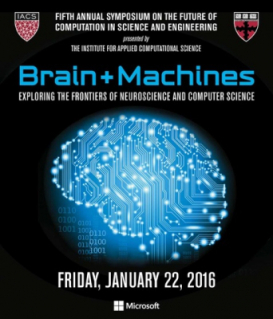“What’s special about us?” Harvard computational science symposium on Brain+Computer systems
On Friday, January 22, 2016 I attended a very interesting symposium organised by Harvard University Institute for Computational Science on “BRAIN + MACHINES: EXPLORING THE FRONTIERS OF NEUROSCIENCE AND COMPUTER SCIENCE”.
Although it fell outside my main research fields, I found it very interesting and enlightening. And the discussed topics could also imply some crucial role for modelling practices.
The introductory speech by David Cox, addressed the role and span of brain studies. First, he pointed out that when we say we want to study the brain, at a deep level, we say we want to study ourselves.
Indeed, we all perceive human species is special. But why is that? We are not the biggest, longest-living, most numerous, most adapted species. We simply cover a niche, as any other species.
What’s special about us is the complexity, not in general sense (nature is plenty of complexity), but specifically complexity of our brain.
Our brain includes 100 billions neutrons, and 100 trillions connections.
We are able to deal with complex information in incredible ways, because each neuron is actually a small computer, and globally our brain is enormously more powerful than any computer built so far.
We therefore build clusters of computers. But this is still not enough to obtain the brain power, we need to understand how brain works, to treat and replicate it.
Typical and crucial problems include to study: vision and image processing, positioning and mobility, and so on.
That’s where I think modelling can play a crucial role here.
As we clearly pointed out in our book Model-driven Development in Practice, modelling and abstraction is a natural way of working for our brain. And I got confirmation from renowned luminaries from Harvard today.
I really think that, should we discover the modelling approaches of our mind, we could disclose a lot of important aspects of several research fields.
Just imagine if:
- we could represent human brain processes through models
- we could replicate these processes and apply modelling techniques for improving, transforming and exploiting such models.
This would pave the way to infinite applications and researches. However, one big challenge opens up for the modelling community: are we able to deal with models including trillions of items??
Any further insights on this?
If you want further details on the event, checkout the official website of the symposium here and my storified social media report here or in the preview below:
To keep updated on my activities you can subscribe to the RSS feed of my blog or follow my twitter account (@MarcoBrambi).
Leave a Comment
You must be logged in to post a comment.








